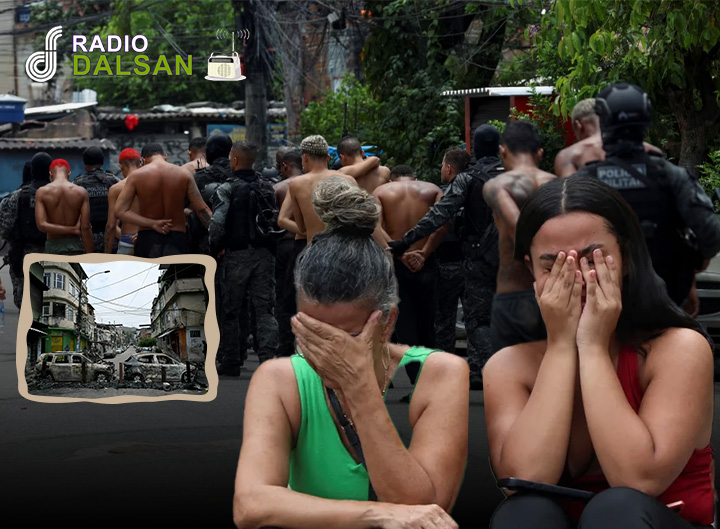Massive Police Raid in Rio de Janeiro Claims 64 Lives Amid Escalating Drug Gang Violence

Massive Police Raid in Rio de Janeiro Claims 64 Lives Amid Escalating Drug Gang Violence
Security officials in Brazil have reported that a large-scale police operation in Rio de Janeiro on Tuesday resulted in the deaths of at least 64 individuals. Four police officers were among the casualties. The raid, one of the deadliest in the city's history, targeted organized crime networks operating in the city’s favelas, particularly the notorious Comando Vermelho (Red Command), Brazil's oldest and most powerful criminal organization.
Governor Cláudio Castro of Rio de Janeiro described the operation as “the biggest in the city’s history.” The police seized a significant quantity of drugs and 42 rifles during the operation, which was conducted by over 2,500 military and civilian personnel. The raid, which had been in planning for over a year, came just ahead of the C40 World Mayors Summit, a major international climate conference scheduled for next week in Rio de Janeiro.
A Deadly Battle in the Favelas
Video footage from Reuters captured dark clouds of smoke rising from the Alemão favela, as police clashed with criminals who used burning cars as barricades. The operation aimed to curb the territorial expansion of the Comando Vermelho gang, which is involved in drug trafficking, extortion, and other criminal activities. According to the think tank InSight Crime, the group has been battling escalating violence from both the state and rival criminal militias in recent years.
During the raid, authorities reported that gang members employed drones to target police officers. A video shared by the state government showed a drone launching a projectile from the air, a tactic previously unseen in Rio’s favelas. The government condemned these attacks as part of what Governor Castro called "narco-terrorism," underscoring the growing danger posed by criminal groups in the region.
Impact on the Community and Global Attention
Residents of the affected neighborhoods expressed fear and frustration. A local woman from the Penha district described the situation as terrifying, noting that gunfire and bomb drops from drones had left the community in chaos. With roads blocked and public transport halted, the operation disrupted daily life across large parts of the city, leaving many residents stranded and uncertain about their safety.
"We’re left without buses, without anything, in this chaos, and not knowing what to do," said Regina Pinheiro, a 70-year-old retiree trying to return home. Her comment illustrates the wide-reaching effects of the police operation, which also grounded traffic on several of Rio's major streets.
Escalating Violence and Criticism
This raid is the latest in a series of high-profile police operations targeting drug gangs in Rio de Janeiro. However, it is the deadliest yet, surpassing the 2021 raid that left 28 people dead. In total, police have seized 42 rifles and arrested at least 81 individuals during the operation.
The use of drones in criminal activities marks an alarming escalation in tactics, according to experts. The operation also drew international attention, with the U.S. State Department advising citizens to avoid the northern parts of Rio due to ongoing clashes between police and criminal factions.
On social media, Governor Castro posted a video showing a drone-controlled attack on police officers, which he described as a new form of criminal resistance. "This is the scale of the challenge we face," he stated, reinforcing his characterization of the situation as "narco-terrorism."
Public Reaction and Human Rights Concerns
While some local politicians, like evangelical pastor Henrique Vieira, condemned the operation, accusing the state of treating favelas as "enemy territory," others voiced concerns about the broader implications. Human rights groups have long criticized the use of such heavy-handed tactics, arguing that they often result in disproportionate violence and fail to address the root causes of crime.
In a statement to AFP, Congresswoman Dani Monteiro, president of the Human Rights Commission of the Rio State Legislative Assembly, called for an investigation into the circumstances of the operation, describing the favelas as having become a "theater of war" due to repeated police actions.
The raid also comes amid a broader debate on police tactics in Brazil. Last year, nearly 700 people died in police operations in Rio, a staggering statistic that highlights the ongoing violence and the toll on both civilians and law enforcement. In 2020, Brazil’s Supreme Court imposed restrictions on police operations in certain areas, such as near schools and hospitals. However, these restrictions were lifted earlier this year, allowing for the kind of aggressive tactics seen in this latest operation.
A Complex Crisis
The tragic events in Rio de Janeiro are a stark reminder of the complex and often violent challenges faced by Brazil’s security forces. While the government maintains that such operations are necessary to combat organized crime, critics argue that they perpetuate a cycle of violence that disproportionately impacts the poorest and most vulnerable communities in the favelas.
As the city prepares for the upcoming international summit, the debate over how to address organized crime and police violence in Rio de Janeiro is unlikely to subside anytime soon. The cost of these operations, in terms of both human lives and social stability, continues to be a pressing issue for Brazil.
